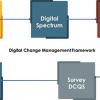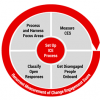Business Transformation Requires Transformational Leaders
Leadership and teaming skills are front and center in times of rapid change. Meet today’s constant disruption head on with expert guidance in leadership, business strategy, transformation, and innovation. Whether the disruption du jour is a digitally-driven upending of traditional business models, the pandemic-driven end to business as usual, or the change-driven challenge of staffing that meets your transformation plans—you’ll be prepared with cutting edge techniques and expert knowledge that enable strategic leadership.
Recently Published
In this Advisor, we examine four common misconceptions that stand in the way of digital transformation.
Autonomous vehicles continue to make headlines.
This Advisor examines the use cases surveyed organizations indicate as being most viable for applying blockchain technology.
Just like excellent poker playing, deciding how and whether to act in an innovative effort requires both fast and slow systems of thinking. You need slow thinking to update your current beliefs with recent learning and then use fast thinking to act based on your experience and intuition. This Advisor explores some examples of fast and slow thinking in today’s organizations.
Jon Ward emphasizes the significance of enabling change. He believes that a culture of experimentation is required for digital transformation to succeed. Ward identifies important elements of an experimental culture, such as encouraging innovation and self-directed teams. He also specifies senior leadership behaviors as well as corporate governance approaches needed to build and reinforce an experimental culture.
The authors observe that many classic change management models fail to consider the significant dimensions of technology and innovation. They recommend developing key performance indicators to track all dimensions of change, which will enable an organization to constantly improve its capability to implement change.They also present a case study.
David Coleman discusses three areas affected by digital transformation: customer experience, operational processes, and business models. Successfully transforming each area depends on a collaborative mindset. Coleman defines this mindset and shows how alignment of purpose and commitment to the task go hand in hand with collaboration. He illustrates the importance of a collaborative mindset in transforming processes that touch customers, internal processes, and the overall business model.
The authors highlight the challenge of resistance to change. They believe that leaders charged with digital transformation often ignore or underestimate employee resistance. And sometimes when they recognize resistance, they write it off as irrational behavior. The authors explore this and other misconceptions that stand in the way of effective digital transformation. They propose an approach for involving and engaging employees in the change.

















